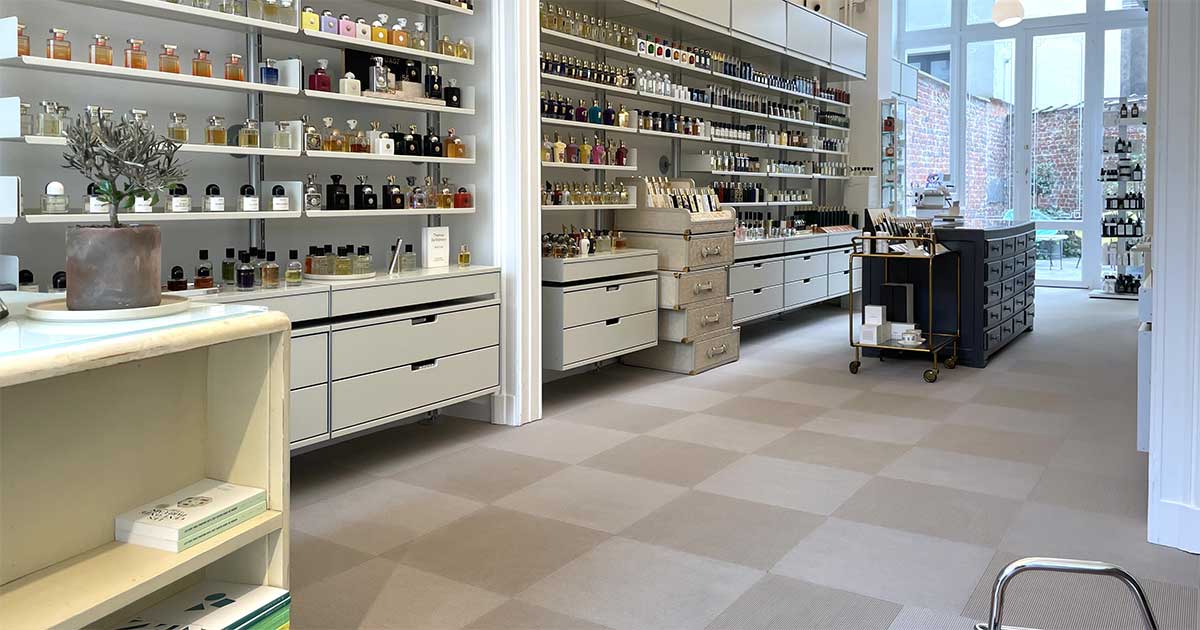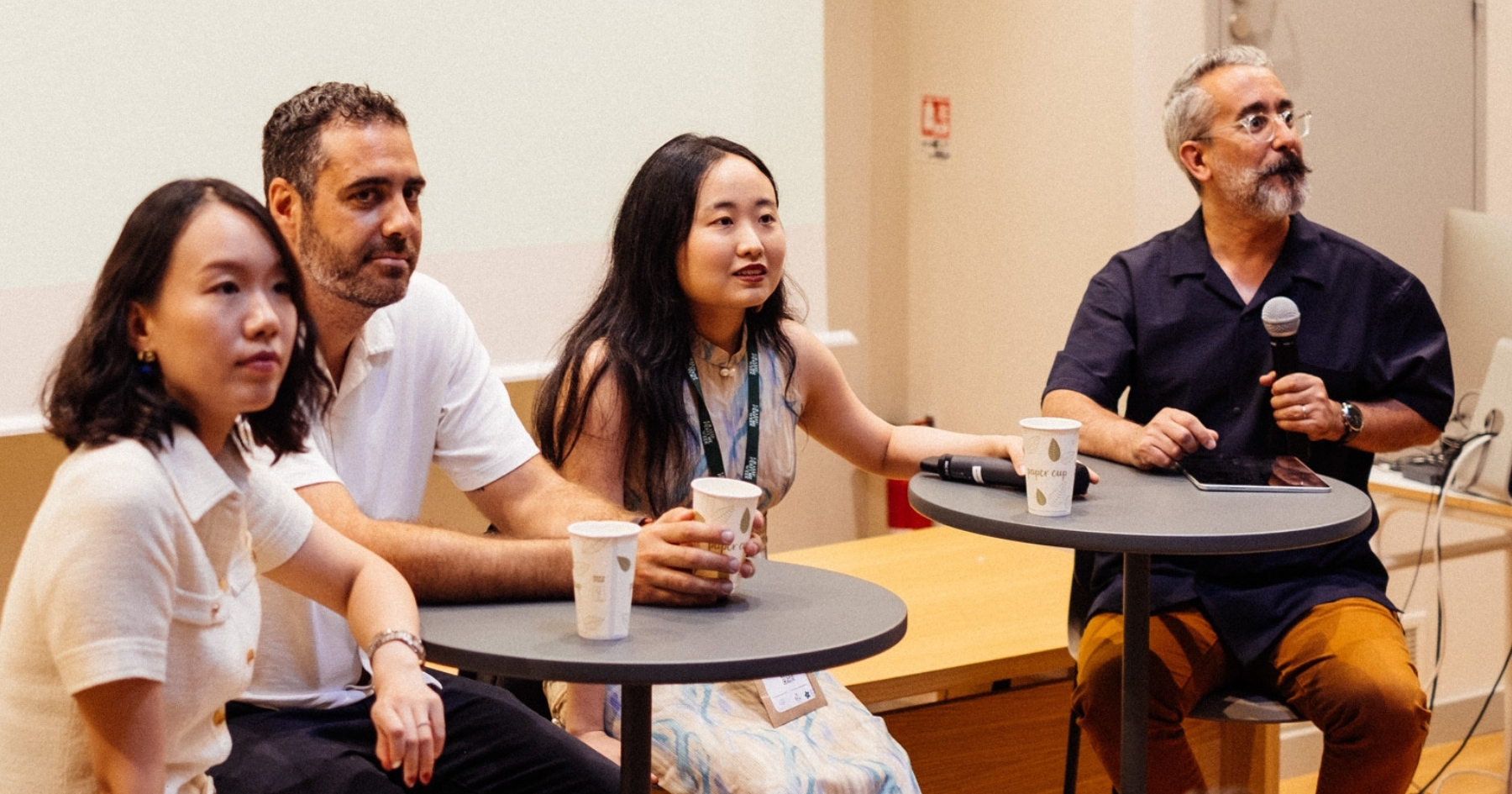Cette publication est également disponible en :
Français
Based in the Grand Sablon district in central Brussels, Beauty by Kroonen is a concept store featuring forty or so niche perfume brands alongside health and beauty products, all carefully chosen by founder Ioana and her team. We interviewed her colleague, Sylviane.
Can you tell us a little about the store?
Beauty by Kroonen was set up by Ioana twelve years ago. She wanted to gather the best of niche perfumery under one roof and create a really cosy atmosphere that encourages people to chat and interact. The store is located in the historic heart of Brussels, in a lovely late 19th-century house surrounded by several other high-end stores of various types.
What brings people into your store?
It’s pretty varied. First, there’s our core of loyal perfume lovers who are very regular visitors. More recently we’ve seen a rise in younger customers, people looking for an alternative to conventional fragrances. They’re seriously interested in niche perfumes and use social media, Instagram in particular, to find out about them. Then there are the tourists who often pop into the store because of our location: they don’t represent our main customer base, but their presence means we do get to open the door to niche perfumery to people who know nothing about it. Lastly are customers who come to the store looking for health and beauty products, who then often take the time to check out the fragrances too.
What are the obstacles in terms of consumers being more used to mainstream creations?
The truth is that we don’t really encounter any obstacles: customers are usually very open-minded; above all they want to be touched and moved. When someone enters the store, we try to find out about them by asking what they wear, so we can start off in familiar territory but add a few elements of surprise. This is why we have to educate ourselves, be familiar with the classics as well as newer releases, and stay constantly informed.
How do you discover brands?
The process takes different forms: we follow specialist online and print publications which review lots of brands. When we are particularly interested in a brand we reach out to them. But we’re also frequently contacted by brands looking for a partnership. And our regular customers tell us about some of their discoveries. Then there are the trade fairs, like Esxence, which are invaluable for encountering brands. We have to sift through all these different sources, because the range on offer has become huge.
How do you choose the brands you sell?
We start by looking at how the brand is presented, its identity and values: whether the raw materials used are interesting, whether the approach is truly innovative.
If it arouses our curiosity, we ask for samples of the full range, because we don’t want to discover that there are only a couple of interesting products. If the touch test is conclusive we test it on skin for several days, to check diffusion and tenacity in particular. Sometimes we even get certain customers to try them! But the brand positioning also has to harmonise with our current selection while adding something new.
How do you define the universes of the brands you sell: do they have anything in common?
With over 40 brands from different parts of the world, their olfactory universes are very diverse. But we select them because they are all committed to investing in the quality of the formulation and ingredients and, most importantly, to creativity. We choose complex fragrances that evolve on the skin, and that tell you the perfumer has been given a free hand.
What are the best sellers?
What we’ve really noticed over the last two years, with the health crisis and state of the world, is a strong craving for cheerful, gentle, comforting fragrances. Particularly among younger customers in search of very gourmand, enveloping scents, with sugary, caramelised, milky notes or more cuddly, cashmere notes. We’ve also noticed a taste for perfumes that smell “clean”.
Are there brands you carry even if they are less profitable?
We think it’s important to offer brands of high artistic quality, even if sales are modest. So it’s vital to continue to carry them. It means we can initiate really interesting discussions and talk about perfume as a work of art and not merely a commercial product; that’s one of our core values. And understanding what surprises and disturbs people, or what resonates with them, all feeds into our exploration of the world of niche perfumery.
- More about Beauty by Kroonen : beautybykroonen.com
REPORT « NICHE AND CONFIDENCES »
- Niche perfumery moves centre stage, by Jessica Mignot
- Sylviane Lust (Beauty by Kroonen) : “We choose complex fragrances that evolve on the skin, and that tell you the perfumer has been given a free hand.”, by Jessica Mignot
- Karine Torrent (Floratropia) : “In my view, 100% natural perfumery is the new niche”, by Jessica Mignot
- Barbara Herman (Eris Parfums): “Whether consciously or not, with each new creation I tend to explore a very different path from the previous one”, by Sarah Bouasse
- Serge Laugier (Le Paravent): “It’s important to me to offer the more niche fragrances, because they always have an unique olfactory signature”, by Jessica Mignot
- Cécile Zarokian: “It’s possible to compete successfully with the big fragrance houses”, by Guillaume Tesson
- Pissara Umavijani (Dusita): “The hardest thing for a perfumer is expressing your signature style in different registers”, by Sarah Bouasse
- Clara Feder and Michel Gutsatz (Le Jardin retrouvé): “We’re trying to build a balanced collection while sticking to our motto: avant-garde as a legacy.”, by Jessica Mignot
- Liam Sardea (LKNU): “We try to guide each person to create their own constellation in this vast cosmos”, by Guillaume Tesson
- Dhaher bin Dhaher (Tola): “I’m spending more and more of my time breaking down barriers between olfactory cultures”, by Guillaume Tesson
- Nathalie Feisthauer (LAB Scent): “For me, niche is a definition of beauty”, by Guillaume Tesson
- Franco Wright (Luckyscent): “Ultimately customers see how the niche category pushes fragrance in more interesting directions”, by Anne-Sophie Hojlo
- Luca Maffei (Atelier Fragranze Milano): “Niche perfumery allows me to take risks”, by Jessica Mignot
- Murat Katran and Mert Guzel (Nishane): “Istanbul is literally a bridge between cultures”, by Guillaume Tesson
- Agnieszka Lukasik (Galilu): “Now, the brands come to us”, by Anne-Sophie Hojlo








Comments